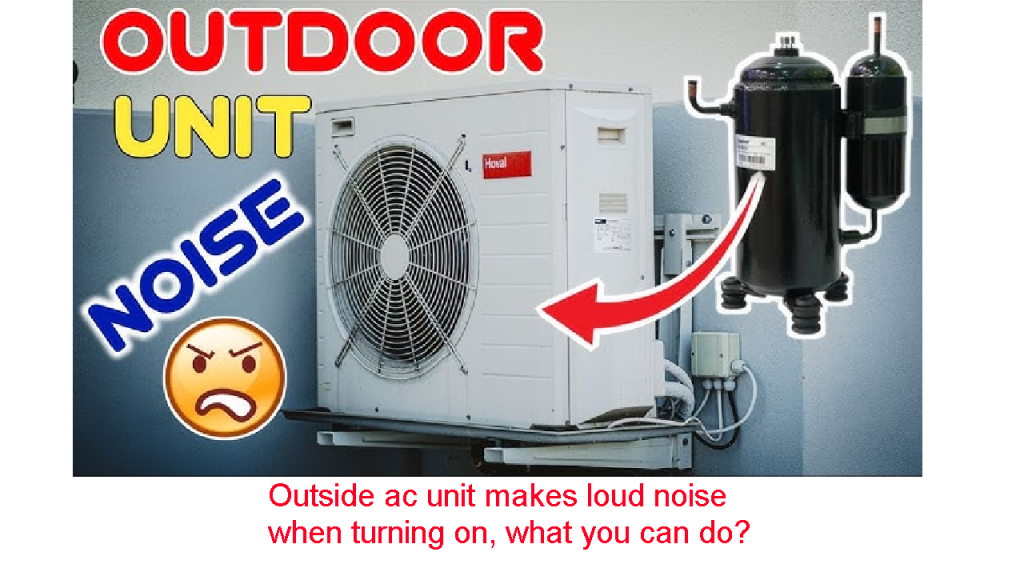🔊 Loud Noise from Outside AC Unit When Turning On? Here’s What to Do
If your outdoor AC unit makes a loud noise when starting, it could be caused by loose parts, compressor issues, fan problems, or electrical faults. Below is a step-by-step troubleshooting guide to help diagnose and fix the problem.

🔍 Step-by-Step Troubleshooting Guide
1️⃣ Identify the Type of Noise
Different noises indicate different issues. Here’s what each sound means:
| Noise Type | Possible Cause | Solution |
|---|---|---|
| Loud Banging/Clanking | Loose or broken fan blade, damaged compressor | Check and tighten fan blades, or call a technician if compressor is damaged |
| Buzzing/Humming | Bad capacitor, loose electrical connections, failing motor | Test capacitor with a multimeter, tighten connections |
| Clicking When Starting | Faulty relay switch or contactor | Replace the contactor |
| Rattling/Vibrating | Loose screws, debris inside unit | Tighten screws, remove debris |
| Screeching/Squealing | Worn-out fan motor bearings or bad belt | Lubricate or replace the motor |
| Hissing or Gurgling | Refrigerant leak | Call a technician to check refrigerant levels |
🚀 Once you identify the noise type, follow the troubleshooting steps below.
🛠 Fixes Based on the Type of Noise
🔧 1. Tighten Loose Screws & Check for Debris (Rattling/Vibrating)
- Turn off the breaker and disconnect switch for safety.
- Remove the top fan cover and check for loose parts or debris inside the unit.
- Tighten any loose screws or bolts on the fan, compressor mounts, or panels.
- Remove any leaves, twigs, or dirt stuck inside.
✅ If noise stops, it was just loose parts or debris.
🛠 2. Check the Fan Blade for Damage (Banging/Clanking Noise)
- Remove the fan cover and inspect the fan blades.
- If they are bent or hitting the side, gently bend them back.
- If the fan is loose on its mount, tighten the screws.
✅ If the fan is damaged beyond repair, replace it.
⚡ 3. Test & Replace a Bad Capacitor (Buzzing/Humming Noise)
A failing capacitor can cause a loud humming noise because it struggles to start the fan and compressor.
How to Test the Capacitor
1️⃣ Turn off the power to the AC unit.
2️⃣ Remove the side panel and locate the capacitor (a cylindrical part with wires).
3️⃣ Check for bulging, leaking, or burn marks.
4️⃣ Use a multimeter to check capacitance (should match the rating on the label).
5️⃣ If bad, replace with an identical µF-rated capacitor.
✅ If noise stops, the capacitor was the issue.
🔄 4. Check & Replace the Contactor (Clicking Noise)
If your unit makes a loud clicking noise when turning on, the contactor relay switch may be faulty.
How to Fix:
- Open the side panel of the unit.
- Locate the contactor (a black/brown switch where wires connect).
- If the contacts are burnt or corroded, replace the contactor.
✅ If clicking stops, the contactor was faulty.
🛠 5. Lubricate or Replace the Fan Motor (Squealing Noise)
- If you hear a high-pitched squealing noise, the fan motor bearings may be dry or worn out.
- Some motors have oil ports—add a few drops of lubricating oil.
- If the motor is still noisy, it may need replacement.
✅ If noise stops after lubrication, the bearings were dry.
🛑 6. Call a Technician for a Compressor Issue (Loud Knocking or Hissing Noise)
- If you hear hissing or knocking, it could mean a refrigerant leak or a failing compressor.
- Signs of a bad compressor:
✔ AC struggles to cool properly.
✔ The unit shakes or vibrates excessively.
✔ Power bills are unusually high.
Fix: Call an HVAC professional—replacing a compressor is expensive and requires special tools.
🚀 Final Tips for Preventing Loud Noises in the Future
✔ Schedule yearly maintenance to keep parts clean and lubricated.
✔ Change your air filters regularly to avoid strain on the system.
✔ Keep the outdoor unit clean and free from debris.
✔ Check screws and fan blades every few months to ensure nothing is loose.
🔎 Summary: What to Do If Your Outdoor AC Is Making Loud Noises
| Noise Type | Likely Cause | Fix |
|---|---|---|
| Banging/Clanking | Loose or broken fan blade, bad compressor | Tighten fan or replace compressor |
| Buzzing/Humming | Bad capacitor, loose wiring, failing motor | Replace capacitor or tighten connections |
| Clicking When Starting | Faulty relay switch, contactor issue | Replace contactor |
| Rattling/Vibrating | Loose screws, debris inside unit | Tighten screws, clean inside |
| Screeching/Squealing | Worn-out fan motor bearings, bad belt | Lubricate or replace motor |
| Hissing/Gurgling | Refrigerant leak | Call an HVAC technician |
